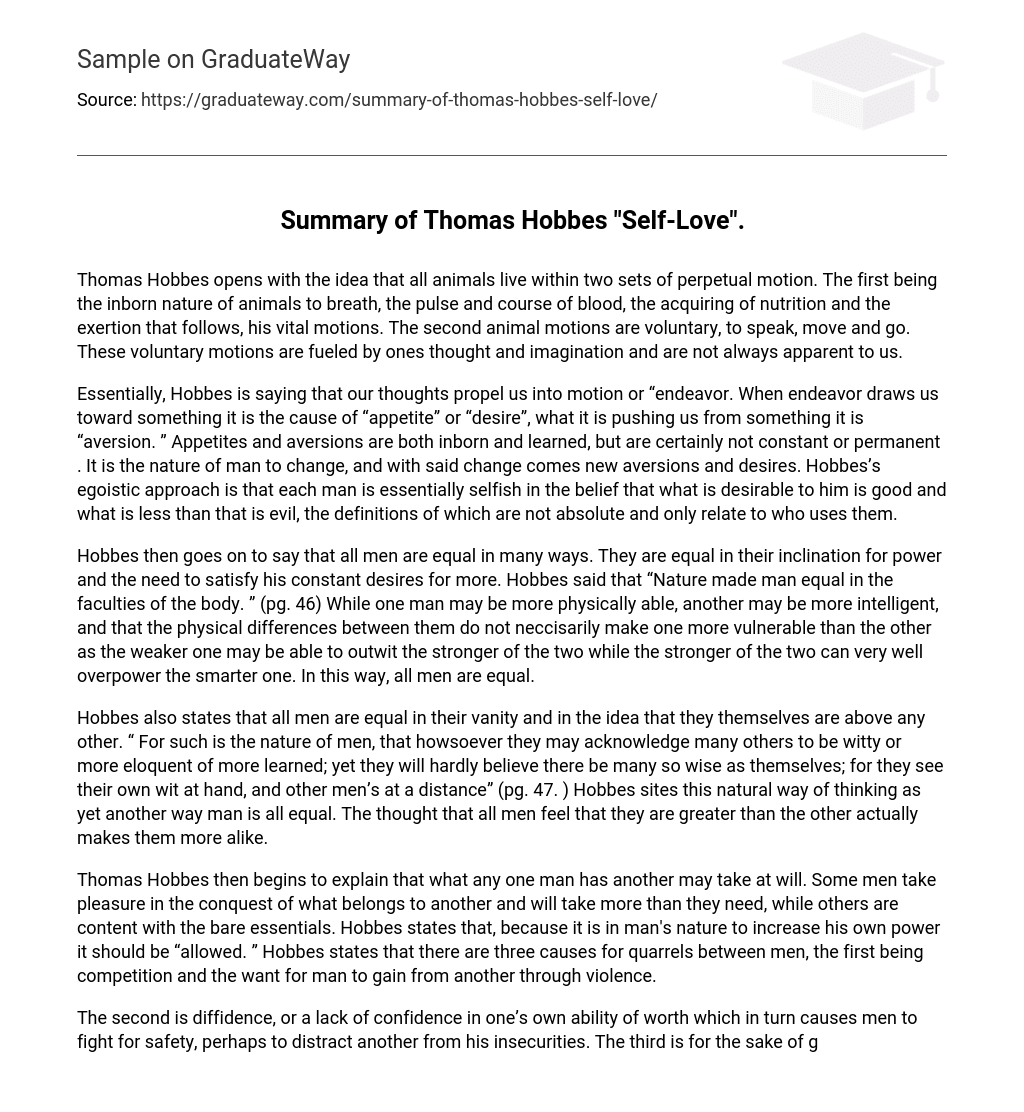Thomas Hobbes opens with the idea that all animals live within two sets of perpetual motion. The first being the inborn nature of animals to breath, the pulse and course of blood, the acquiring of nutrition and the exertion that follows, his vital motions. The second animal motions are voluntary, to speak, move and go. These voluntary motions are fueled by ones thought and imagination and are not always apparent to us.
Essentially, Hobbes is saying that our thoughts propel us into motion or “endeavor. When endeavor draws us toward something it is the cause of “appetite” or “desire”, what it is pushing us from something it is “aversion. ” Appetites and aversions are both inborn and learned, but are certainly not constant or permanent . It is the nature of man to change, and with said change comes new aversions and desires. Hobbes’s egoistic approach is that each man is essentially selfish in the belief that what is desirable to him is good and what is less than that is evil, the definitions of which are not absolute and only relate to who uses them.
Hobbes then goes on to say that all men are equal in many ways. They are equal in their inclination for power and the need to satisfy his constant desires for more. Hobbes said that “Nature made man equal in the faculties of the body. ” (pg. 46) While one man may be more physically able, another may be more intelligent, and that the physical differences between them do not neccisarily make one more vulnerable than the other as the weaker one may be able to outwit the stronger of the two while the stronger of the two can very well overpower the smarter one. In this way, all men are equal.
Hobbes also states that all men are equal in their vanity and in the idea that they themselves are above any other. “ For such is the nature of men, that howsoever they may acknowledge many others to be witty or more eloquent of more learned; yet they will hardly believe there be many so wise as themselves; for they see their own wit at hand, and other men’s at a distance” (pg. 47. ) Hobbes sites this natural way of thinking as yet another way man is all equal. The thought that all men feel that they are greater than the other actually makes them more alike.
Thomas Hobbes then begins to explain that what any one man has another may take at will. Some men take pleasure in the conquest of what belongs to another and will take more than they need, while others are content with the bare essentials. Hobbes states that, because it is in man’s nature to increase his own power it should be “allowed. ” Hobbes states that there are three causes for quarrels between men, the first being competition and the want for man to gain from another through violence.
The second is diffidence, or a lack of confidence in one’s own ability of worth which in turn causes men to fight for safety, perhaps to distract another from his insecurities. The third is for the sake of glory, or to secure his reputation. Thomas Hobbes says that, because all men have a natural animalistic inclination to fight for what we want and believe we deserve, a “common power”, a government or hierarchy of some sort, is vital to maintaining a semblance of peace. Hobbes muses that, without security outside of us there will be no industry or commodities, no modern comforts, no society.
Without someone to lord over us in some way our future will be one of “continual fear, and danger of violent death; and the life of man, solitary, poor, nasty, brutish and short…” (pg. 48). And, while we enjoy the comforts that society’s structures allow for us, our leaders are constantly on guard in defense of our freedoms and their positions of leadership. They are “in the state and posture of gladiators; having their weapons pointing, and their eyes fixed on one another. ” (pg. 48) They are always ready for war.





